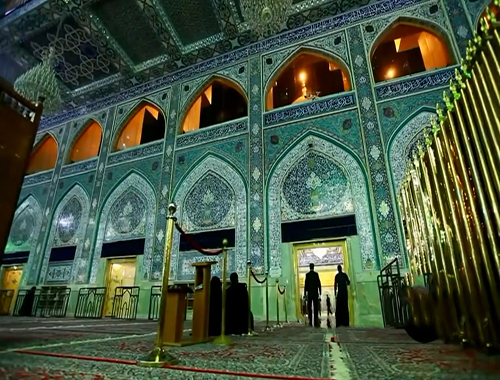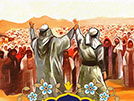Introduction
- Details
- Hits: 3545
Introduction
--------------------------------------------------------------------------------
In the name of Allah, the Beneficent the Merciful
By the grace and assistance of Allah, the translation and publication of the commentary of more than two parts of the Qur'an in English under the title of 'An Enlightening Commentary, into the Light of the Holy Qur'an' have been successfully fulfilled in three volumes. These humble volumes were ardently met and well received by many sincere believers in most parts of the world.
When the readers reflected their enthusiastic affections and we were aware of their kind, cooperative and leading points of view about the task as a helpful Islamic ideological reference for them, and they appreciated especially the involving traditions from the Holy Prophet [s] and his AhIul-Bayt [a], we understood that not only the exegesis of the verses of the Qur'an were useful for them, but the concerning Islamic traditions were also warmly embraced and utilized widely.
Besides that, via their communications, we felt their desire and the urgent need of the Age for such leading statements, too. Therefore, it was decided that the present valuable collection of holy traditions which were carefully selected by Ayatullah 'Allamah Mujahid Al-Haj Sayyid Kamal Faghih Imani, to be translated into English and offered to the believing Muslims.
On the other hand, regarding the Prophet's famous tradition known as 'Thaqalayn' (two weighty causes), and putting it into action, next to the publication of the above-mentioned commentary of the Qur'an, and to provide traces in the English language from both the Holy Qur'an and AhIul-Bayt [a] together before our eyes, it was thought that the translation of at least a small collection of traditions from Holy AhIul-Bayt [a] would be supplied, so that these 'Two Weighty Causes' may work parallel and not to be separated from each other. Therefore, this favourable task was adventured in order that a short distance might be paved towards the path of the obedience of the godly advice of the Messenger of Allah [s] in the above mentioned magnificent tradition.
So, for the present time, the very humble endeavour was prepared and entitled: 'A BundIe of flowers from the Garden of Traditions of the Holy Prophet & Ahlul Bayt [a]' to indicate, firstly, the origin of the materials and, secondly, that the collection is merely a small portion of their vast ocean of varying knowledge which is linked to the illimitable knowledge of Allah, because the Holy Ahlul-Bayt [a] are the same ones whom Allah has called "ar-rasikhuna fil 'ilm" (those deeply established in knowledge), where He (s.w.t.) says:
"... But no one knows its hidden meaning except Allah, and those who are firmly grounded in knowledge..." (Sura Al-I-Imran, No.3, verse 7).
However, it is certain that if this group of expressive traditions and the like of them be practically observed by receptive people, the resulting merits of those divinely-linked statements will be abundantly beneficial in every step of their lives: socially, economically, morally, ethically, and so on, Allah-Willing. So, we ask Allah (s.w.t.) to shower His ceaseless infinite mercy upon all those who study this book and try to act according to its involving reasonable ideas.
It is necessary to say, here, that some of the Arabic words involved in the traditions , such as: I na-mahram /, have rarely any equivalents in English to convey their exact meaning.
Hereby, we sincerely appreciate not only the estimable people who helped us with the completion of this book, but also the valuable helpful instructive views we will receive from you, dear reader, which can surely be encouraging and animating for us. Therefore, we thank you in anticipation and ask you to communicate with us by the publisher's address:
The Scientific, Religious Research Center,
Amir-ul-Mu'mineen Ali (as.) Public Library, Isfahan, Iran.
We praise Allah and hope that may He forgive all our faults and shortcomings, and, accept this small endeavour from us with giving rewards to all those who have had a share, of any kind, in it, both in this world and the next world.
Was-Salam
Sayyid Abbas Sadr-'ameli
Translator
August 1997











